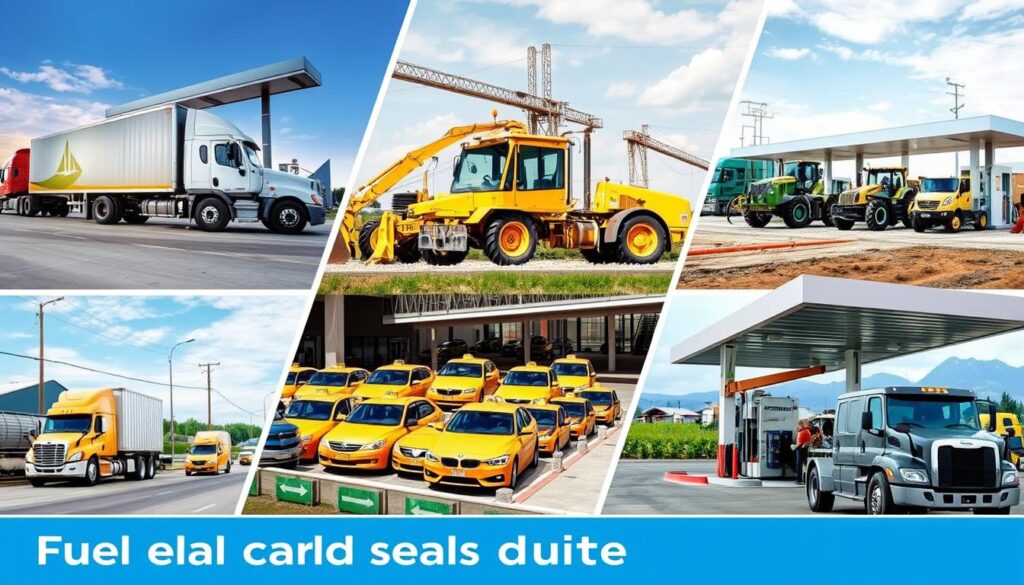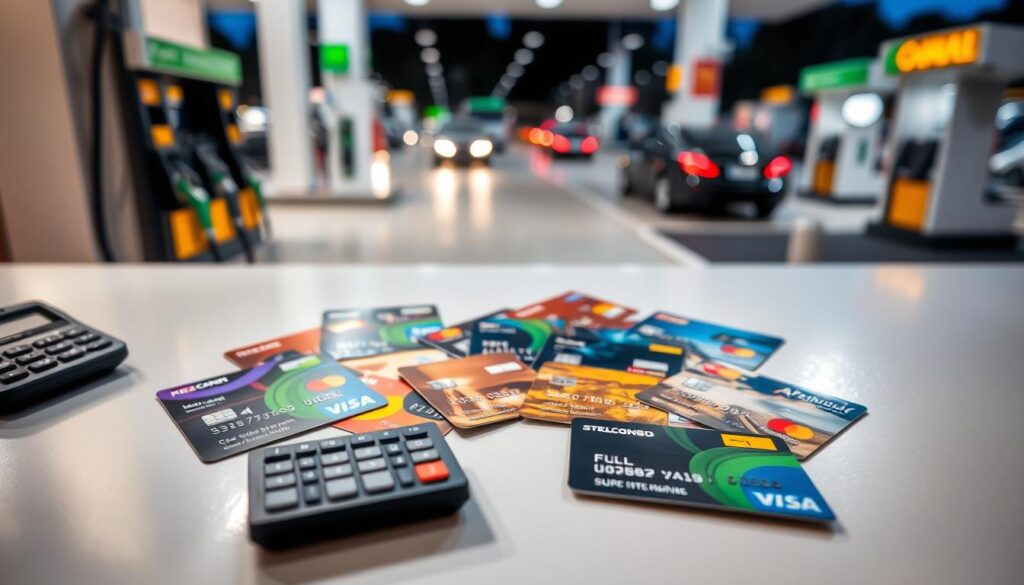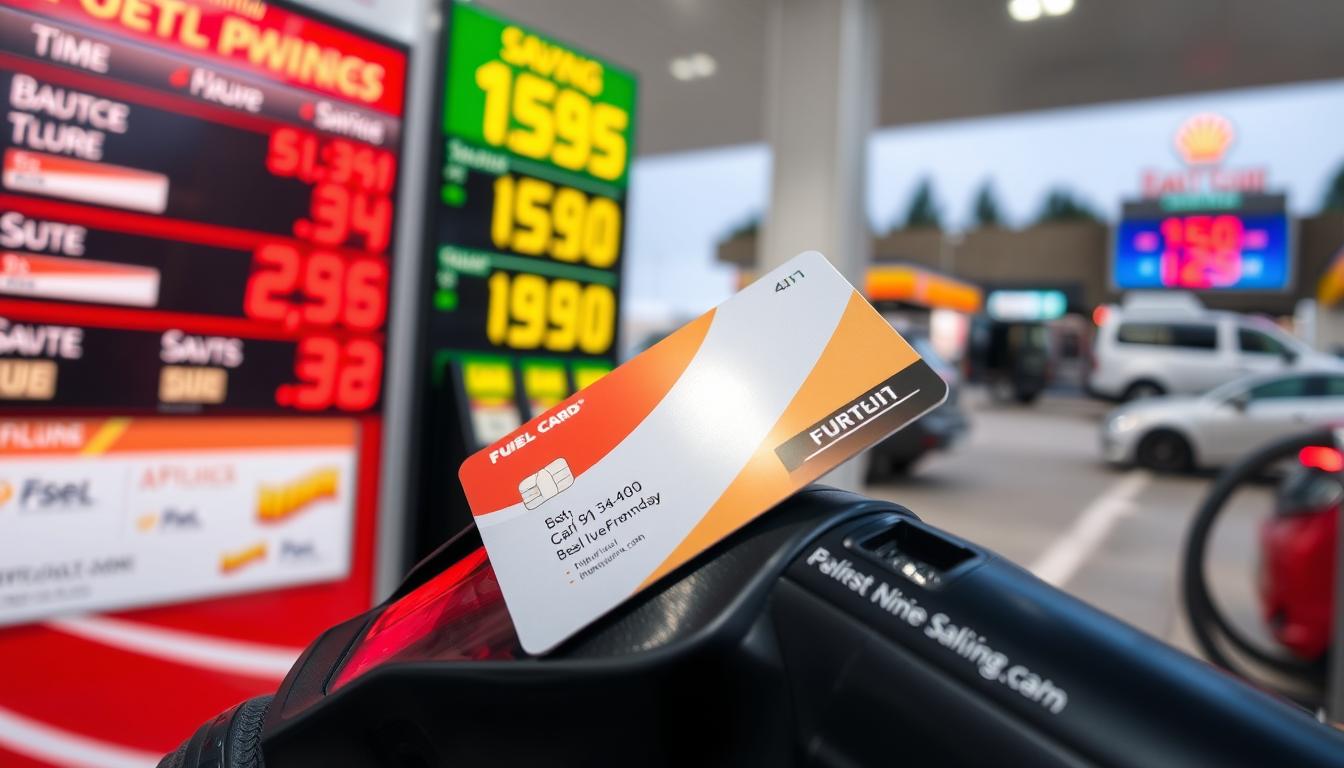Did you know that businesses can save an average of $0.10 to $0.25 per gallon when utilizing fuel card services? This substantial cost reduction can significantly impact a company’s financial health. Fuel card programs not only simplify the process of fuel acquisition but also offer invaluable insights into fuel expenditures. By integrating fleet fuel cards, organizations can enhance operational efficiency, diminish administrative tasks, and ultimately, augment their financial performance. This article delves into the definition, advantages, and operational intricacies of these potent financial instruments.
Key Takeaways
- Fuel card services can lead to significant savings on fuel costs.
- Implementing fleet fuel cards improves monitoring and management of fuel usage.
- Streamlined processes reduce administrative workload for fleet managers.
- Access to detailed reporting helps businesses identify spending patterns.
- Different types of fuel cards cater to specific business needs and industries.
- Choosing the best fuel cards can enhance overall fleet efficiency.
- As technology evolves, fuel card services are becoming increasingly sophisticated.
What Are Fuel Card Services?
Fuel card services are pivotal for businesses aiming to manage fuel costs for their fleets. These credit cards allow organizations to monitor all fuel purchases, enhancing security and convenience. They cater to both small and large corporations, simplifying the payment process at select gas stations. This streamlines fuel card management, making it more efficient.
Definition and Overview
Fuel card services are tailored for businesses to manage fuel transactions for their vehicles. They offer secure payment options, eliminating the need for cash or personal expenses. These services include real-time transaction tracking, aiding fleet managers in monitoring fuel usage effectively.
Key Features
Several key features distinguish fuel card services from traditional fuel payment methods:
- Detailed Reporting: Comprehensive reports help businesses analyze their fuel expenses and usage trends over time.
- Real-Time Monitoring: Managers can track fuel purchases instantly, providing better oversight and control.
- Discounts: Many corporate fuel cards offer discounts at partner fuel stations, leading to potential savings for businesses.
- Spending Limits: Companies can set individual spending limits for drivers or vehicles to control costs.
Benefits of Using Fuel Card Services
Employing fuel card services offers numerous advantages for fleet operations. Business proprietors can reap significant benefits that directly impact their financial outcomes. By grasping these advantages, fleets can identify the most suitable fuel cards for their specific requirements.
Cost Savings Explained
One of the foremost fuel card solutions businesses value is the substantial cost savings potential. Fuel card programs frequently incorporate discounts at participating stations, thereby reducing fuel costs substantially. Additionally, these services mitigate the risks of fuel theft and unauthorized transactions, resulting in further cost reductions.
- Discounts on fuel prices at specific stations
- Elimination of unauthorized purchases
- Reduced administrative costs related to expense tracking
Time Efficiency in Fleet Management
Time efficiency is another critical benefit of fuel card utilization. Fleet managers gain access to detailed reports on fuel consumption, streamlining the tracking process. This capability enables managers to concentrate on more strategic endeavors, thereby enhancing overall productivity. For deeper insights into leveraging fuel card benefits, refer to this resource, which offers valuable information on how fuel cards optimize fleet operations.
Types of Fuel Cards Available
Exploring fuel card services necessitates an understanding of the various types available. This knowledge is crucial for selecting the most suitable option for your fleet. The market offers two main categories: proprietary fuel cards and universal fuel cards. Each category boasts unique benefits, catering to different operational requirements.
Proprietary Fuel Cards
Proprietary fuel cards are designed for use at specific fuel station networks. These cards often come with exclusive perks, such as loyalty rewards and discounts. These incentives are intended to foster consistent usage at partner stations. This model is particularly beneficial for companies with operations confined to a particular area, relying heavily on specific fueling stations.
Universal Fuel Cards
In contrast, universal fuel cards provide greater flexibility for managing fuel expenses across diverse locations. These cards are accepted at numerous fuel stations, making them ideal for fleets with extensive travel routes. This adaptability simplifies cost management, ensuring drivers can refuel conveniently wherever needed.
How Fuel Card Services Work
Understanding the mechanics behind fuel card services is crucial for businesses aiming to optimize fuel expenses. The journey begins with fuel card applications, where companies submit vital information such as their details and projected fuel consumption. Following a thorough evaluation, approval is granted, empowering businesses to leverage these services fully.
Application and Approval Process
The application process for fuel card services encompasses several critical steps:
- Submitting company details
- Specifying fleet size
- Estimating anticipated fuel usage
Upon approval, businesses are granted access to comprehensive fuel card management services. These services are designed to enhance daily operations significantly.
Daily Operations and Usage
Once equipped with fuel cards, drivers can refuel at participating stations with ease. The process of fuel purchases is streamlined, with transactions automatically recorded, thus saving time and minimizing errors. Fleet managers can optimize efficiency by utilizing online dashboards that provide detailed insights into spending patterns. This enables companies to refine their fuel card management strategies effectively. Moreover, tracking expenses becomes more straightforward, fostering greater fiscal accountability. For a more detailed exploration of how these systems streamline operations, refer to this comprehensive guide on fuel card.
Key Providers of Fuel Card Services
Businesses seeking fuel card services must identify providers that meet their operational needs. The market is dominated by major fuel card providers, each offering tailored features for various industries.
Major Fuel Card Companies
In the U.S., several notable fuel card providers stand out:
- WEX – Renowned for its extensive network and flexible options.
- Fleetcor – Provides comprehensive reporting tools and discounts.
- Comdata – Praised for its customer service and diverse acceptance locations.
Comparing Offers and Features
Businesses should invest time in comparing the best fuel cards available. Each provider offers unique advantages, such as:
- Discount structures that vary from provider to provider.
- Fuel transaction reporting capabilities for enhanced management.
- Network acceptance ensuring easy access across locations.
By assessing these factors, companies can choose fuel card services that align with their budget and operational needs.
Fuel Cards for Different Industries

Fuel card services cater to the unique needs of diverse sectors, offering bespoke fuel card solutions. Efficient fuel management is paramount in transportation and logistics, as well as in construction. These industries face challenges that corporate fuel cards adeptly address.
Transportation and Logistics
In the transportation and logistics sector, companies depend on fuel card services to minimize expenses. Transport fleets face substantial fuel costs. Fuel card solutions simplify tracking usage and managing fuel expenses, ensuring profitability. They offer:
- Detailed reporting on fuel consumption
- Real-time tracking of fuel spend
- Access to discounts at numerous stations
Construction and Heavy Equipment
The construction industry operates heavy machinery that consumes considerable fuel. Fuel card services aid contractors in effectively monitoring fuel expenditures. Employing corporate fuel cards streamlines fuel management processes. Key advantages include:
- Enhanced oversight of fuel-related expenditures
- Facilitation of bulk purchases and discounts
- Improved accountability within teams
The Role of Fuel Management in Fleet Operations
Efficient fuel management is pivotal for fleet operations’ success. With fuel costs escalating, precise tracking and management can yield substantial savings and performance enhancements. Fleet fuel cards serve as an effective tool for controlling fuel expenses and consumption patterns.
Importance of Fuel Tracking
Accurate fuel tracking is crucial for identifying consumption trends and uncovering potential issues within fleet operations. By monitoring fuel usage, businesses can:
- Detect anomalies that may indicate fuel theft or mismanagement.
- Analyze patterns to identify the most efficient routes and driving behaviors.
- Calculate fuel expenses accurately for budgeting and forecasting needs.
Implementing Fuel Management Strategies
Implementing robust fuel management strategies enhances operational efficiency. Some effective strategies include:
- Conducting regular audits of fuel card solutions to ensure compliance and accuracy.
- Utilizing advanced reporting features available with fleet fuel cards for detailed insights.
- Training staff on best practices for fuel management to mitigate waste and inefficiencies.
Understanding Fuel Price Fluctuations
Fuel prices are subject to numerous influences, including geopolitical events and seasonal demands. For businesses that heavily rely on travel and logistics, grasping these fluctuations is crucial for cost management. Utilizing fuel card services can notably reduce expenses, aligning purchases with the dynamic fuel price trends that evolve throughout the year.
How Fuel Cards Mitigate Costs
Fuel card benefits transcend mere convenience. They often provide fixed pricing agreements and discounts during high-demand periods. By employing fuel cards judiciously, enterprises can substantially cut their fuel costs, ensuring operational efficiency. During price spikes, the utilization of fuel cards can significantly impact spending, contrasting with traditional payment methods.
Seasonal Trends and Their Impact
Grasping seasonal trends is pivotal for businesses to optimize fuel consumption. In peak travel seasons, prices tend to escalate due to heightened demand. Companies that synchronize their fuel card usage with seasonal price trends can capitalize on savings. Through advanced planning and price monitoring, fleets can make informed decisions, thereby refining their budget management strategies.
Security Features of Fuel Card Services
In the realm of fuel card services, the imperative for stringent security protocols is paramount. Countless enterprises rely on these cards for the streamlined management of fuel expenditures. The enhancement of fuel card security necessitates the deployment of efficacious fraud prevention tactics and rigorous data protection protocols. These measures not only fortify the financial stability of corporations but also shield the personal data of drivers.
Fraud Prevention Measures
Fraud poses a substantial threat to entities employing fuel card services. To counteract this menace, numerous providers implement diverse fraud prevention strategies. These strategies encompass:
- PIN protection – Mandating a unique personal identification number for transactional activities
- Transaction alerts – Issuing notifications for each purchase to identify unauthorized transactions
- Spending limits – Imposing restrictions on fuel expenditures to avert excessive outlays
These methodologies are pivotal in upholding transaction integrity and fostering prudent utilization.
Data Protection and Compliance
Data protection is indispensable for any financial service. Fuel card providers must comply with legal mandates to uphold data protection standards. This entails a variety of practices aimed at safeguarding both financial and personal data, including:
- Encryption technologies – Ensuring data security during transmission and storage
- Regular audits – Performing assessments to confirm adherence to industry benchmarks
- Employee training – Educating personnel on data protection policies and practices
Such initiatives elevate the security profile of fuel card services, fostering trust among clientele.
Integration with Fleet Management Systems
Integrating fuel card solutions with fleet management systems can significantly enhance business efficiency. By employing fuel card integration, companies can streamline processes and improve the overall management of their fleet operations. This integration facilitates real-time access to vital data, making it easier to track fuel usage and expenses.
Benefits of Fleet Management Software
Fleet management software offers numerous advantages for organizations that utilize fuel cards, including:
- Enhanced accuracy in tracking fuel consumption and expenditures.
- Improved resource allocation, saving time and reducing costs.
- Automated reporting, minimizing manual data entry and potential errors.
Streamlining Operations with Technology
Utilizing technology within fleet management systems can lead to an overall increase in operational efficiency. Fuel card integration allows for quick data processing and easy access to analytics that help optimize fleet performance. Companies leveraging these advanced systems can navigate the complexities of fuel card solutions more effectively, ensuring that their operations run smoothly and cost-efficiently.
Customer Support and Resources
Effective customer support is crucial for the success of fuel card services. Businesses utilizing these services often face various operational challenges. Strong support ensures prompt resolution of issues, maintaining uninterrupted service.
Importance of Quality Service
Quality customer support significantly enhances user experience and builds trust between the provider and user. Responsive support can transform minor issues into major operational setbacks. Businesses reliant on fuel card services benefit greatly from competent assistance.
Training and Onboarding for Users
User training is vital for the onboarding process of fuel card services. Providers typically offer structured programs to educate businesses on best practices. This training equips drivers and managers with the knowledge to use the system effectively, optimizing resource utilization and streamlining operations.
How to Choose the Right Fuel Card Service

Selecting the appropriate fuel card service is crucial for managing your fleet effectively. Various factors come into play during this decision-making process. Understanding these components will guide you in choosing fuel cards that align with your operational needs.
Factors to Consider
When evaluating fuel card services, it’s vital to assess:
- Transaction Fees: Understanding the cost structure is crucial to avoid unexpected charges.
- Acceptance Locations: Check whether the fuel card is widely accepted in regions your fleet operates.
- Reporting Tools: Useful reporting features can greatly aid in tracking fuel consumption and expenses.
- Customer Service: Reliable support is essential, especially when issues arise.
Evaluating Your Fleet’s Needs
Evaluating fleet needs involves a few key steps. Begin by considering your business’s growth trajectory and average fuel consumption. This insight will direct you towards fuel card services that cater to these demands. Additionally, factor in the potential for various fuel purchases across locations, which will influence your ability to handle unexpected changes. For more detailed guidance on choosing the right fuel card for your business, check out this resource.
Future Trends in Fuel Card Services
The evolution of fuel card services is being propelled by technological progress and a heightened focus on environmental stewardship. Digital fuel cards are increasingly favored, as they offer operational efficiencies and support sustainable fuel practices. This shift is driven by the need for solutions that enhance business operations while promoting eco-friendly fuel use.
Digital Innovations and Technology
Recent developments in fuel card services underscore a pronounced trend towards digital advancements. The integration of mobile apps is becoming widespread, enabling fleet managers to access real-time data and track fuel expenditures remotely. Additionally, the introduction of advanced analytics is providing deeper insights into fuel consumption patterns, facilitating cost optimization and efficiency improvements.
The Shift Towards Sustainability
The growing emphasis on sustainability in fuel use is prompting fuel card providers to offer more eco-conscious options. These include tools for measuring carbon footprints and assessing environmental impacts. As businesses increasingly prioritize green practices, the demand for sustainable fuel card solutions is anticipated to escalate.
Conclusion: Making the Most of Fuel Card Services
Fuel card services present a strategic advantage for businesses seeking to enhance operational efficiency and manage fuel costs effectively. By utilizing corporate fuel cards, companies can achieve notable cost savings, streamline processes, and improve data management. Understanding the diverse fuel card benefits and available card types enables businesses to make informed decisions, aligning with their specific needs.
Recap of Key Points
This article has delved into the operation of fuel card services, their various forms, and their critical role in fleet management. Key features such as fraud prevention, software integration, and customer support underscore the importance of selecting the appropriate service. Additionally, recognizing fuel price fluctuations and implementing effective fuel management strategies can significantly boost your company’s performance.
Encouragement to Explore Options
The fuel card sector is undergoing significant transformations, driven by digital innovations and a growing emphasis on sustainability. Businesses are advised to thoroughly explore their options. Each organization’s requirements are unique, and identifying the most suitable fuel card solutions can lead to substantial improvements in both cost and operational management. Engage with the world of fuel card services to unlock their full potential for your enterprise.
